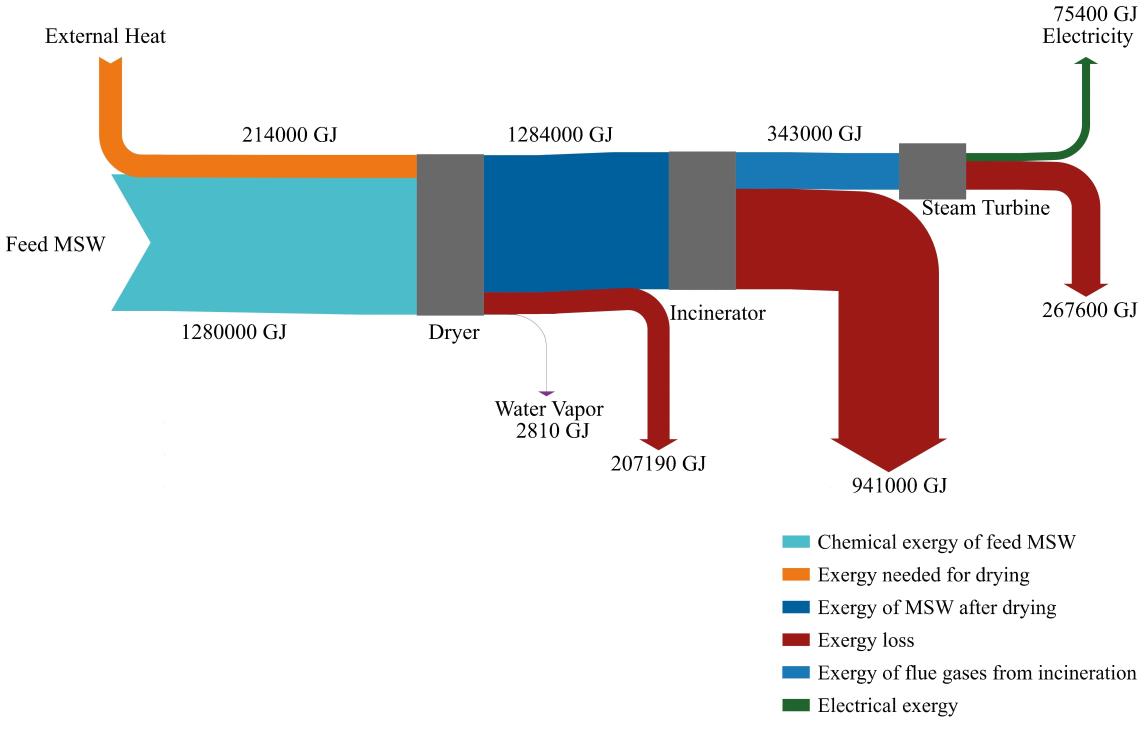Exergy Analysis of Waste-to-Energy Technologies for Municipal Solid Waste Management 10.32526/ennrj/22/20240023
Main Article Content
Abstract
In recent years, there have been increasing concerns over the detrimental effects of irreversible linear patterns of material and energy consumption, which have led to an enormous generation of municipal solid waste (MSW). Concepts like waste-to-energy (WtE) and recycling have gained increasing recognition and support as responses to these challenges. This study assessed the exergetic potential of four WtE technologies (landfill gas-to-energy, anaerobic digestion, incineration, and plasma gasification) in the context of the MSW characteristics of Maiduguri, Borno State. The population of Maiduguri, waste generation rate, waste composition, and the ultimate and proximate analysis of the MSW were used for the assessment. Exergetic potential in the form of electrical energy generation and three exergy-based indicators (exergy efficiency, exergy defect, and improvement potential) were evaluated for each WtE option. The results reveal that anaerobic digestion and plasma gasification are viable options based on the exergetic potential and the measured exergy performance indicators. These findings offer valuable insights for policymakers and waste management authorities, facilitating informed decisions to address environmental concerns and promote resource-efficient urban development in Maiduguri and similar regions.
Article Details

This work is licensed under a Creative Commons Attribution-NonCommercial 4.0 International License.
Published articles are under the copyright of the Environment and Natural Resources Journal effective when the article is accepted for publication thus granting Environment and Natural Resources Journal all rights for the work so that both parties may be protected from the consequences of unauthorized use. Partially or totally publication of an article elsewhere is possible only after the consent from the editors.
References
Achinas S, Euverink GJ. Theoretical analysis of biogas potential prediction from agricultural waste. Resource-Efficient Technologies 2016;2(3):143-7.
Aghbashlo M, Tabatabaei M, Soltanian S, Ghanavati H. Biopower and biofertilizer production from organic municipal solid waste: An exergoenvironmental analysis. Renewable Energy 2019;143:64-76.
Alexander A, Burklin C, Singleton A. Landfill gas emissions model (LandGEM) version 3.02 user’s guide [Internet]. 2005 [cited 2023 Jul 14]. Available from: https://www3.epa.gov/ ttncatc1/dir1/landgem-v302-guide.pdf.
Bakas I, Laurent A, Clavreul J, Saraiva AB, Niero M, Gentil E, et al. LCA of solid waste management systems. In: Hauschild MZ, Rosenbaum RK, Olsen SI, editors. Life Cycle Assessment: Theory and Practice. Cham, Switzerland: Springer Nature; 2018. p. 887-926.
Cavalcanti EJ, Carvalho M, Ochoa AA. Exergoeconomic and exergoenvironmental comparison of diesel-biodiesel blends in a direct injection engine at variable loads. Energy Conversion and Management 2019;183:450-61.
Chen L, Xiao K, Hu F, Li Y. Performance evaluation and optimization design of integrated energy system based on thermodynamic, exergoeconomic, and exergoenvironmental analyses. Applied Energy 2022;326:Article No. 119987.
Cudjoe D, Han MS, Nandiwardhana AP. Electricity generation using biogas from organic fraction of municipal solid waste generated in provinces of China: Techno-economic and environmental impact analysis. Fuel Processing Technology 2020;203:Article No. 106381.
Dauda M, Osita OO. Solid waste management and re-use in Maiduguri, Nigeria [Internet]. 2003 [cited 2024 Mar 20]. Available from: https://hdl.handle.net/2134/30546.
Esohe B. The Current state of waste management in Nigeria and the challenges of transitioning to a circular economy [Internet]. 2023 [cited 2023 Jul 2]. Available from: https://www.linkedin.com/pulse/current-state-waste-management-nigeria-challenges-circular-braimah/.
Fellaou S, Bounahmidi T. Analyzing thermodynamic improvement potential of a selected cement manufacturing process: Advanced exergy analysis. Energy 2018;154:190-200.
Gaudreau K, Fraser RA, Murphy S. The Characteristics of the exergy reference environment and its implications for sustainability-based decision-making. Energies 2012:5(7): 2197-213.
Hadidi LA, Omer MM. A financial feasibility model of gasification and anaerobic digestion waste-to-energy (WTE) plants in Saudi Arabia. Waste Management 2017;59:90-101.
Huang W, Fooladi H. Economic and environmental estimated assessment of power production from municipal solid waste using anaerobic digestion and landfill gas technologies. Energy Reports 2021;7:4460-9.
Jadhao SB, Shingade SG, Pandit AB, Bakshi BR. Bury, burn, or gasify: Assessing municipal solid waste management options in Indian megacities by exergy analysis. Clean Technologies and Environmental Policy 2017;19:1403-13.
Jones GA, Hollier G. Resources, Society and Environmental Management. United Kingdom: SAGE Publications Ltd; 1997.
Kaza S, Yao L, Bhada-Tata P, Van Woerden F. What a Waste 2.0: A Global Snapshot of Solid Waste Management to 2050. Washington, DC: World Bank; 2018.
Kofoworola OF. Comparative assessment of the environmental implication of management options for municipal solid waste in Nigeria. International Journal of Waste Resources 2016;7(1):Article No. 1000259.
Magnanelli E, Berglihn OT, Kjelstrup S. Exergy-based performance indicators for industrial processes. International Journal Energy Research 2018;42:3989-4007.
Nanda S, Berruti F. Municipal solid waste management and landfilling technologies: A review. Environmental Chemistry Letters 2021;19:1433-56.
Ogunjuyigbe ASO, Ayodele TR, Alao MA. Electricity generation from municipal solid waste in some selected cities in Nigeria: An assessment of feasibility, potential and technologies. Renewable and Sustainable Energy Reviews 2017;80:149-62.
Oumarou MB, Dauda M, Sulaiman AT, Babagana MT. Characterization and generation of municipal solid wastes in Northeastern Nigeria. Continental Journal of Renewable Energy 2012;3(1):1-7.
Oumarou MB, Shodiya S, Ngala GM, Bashir MA. Artificial neural network modelling of the energy content of municipal solid wastes in Northern Nigeria. Arid Zone Journal of Engineering, Technology and Environment 2017;13(6):840-7.
Rivero R, Garfias M. Standard chemical exergy of elements updated. Energy 2006;31(15):3310-26.
Sato N. Chemical Energy and Exergy: An Introduction to Chemical Thermodynamics for Engineers. Elsevier Science and Technology Books; 2004.
Soltanian S, Kalogirou SA, Ranjbari M, Amiri H, Mahian O, Khoshnevisan B, et al. Exergetic sustainability analysis of municipal solid waste treatment systems: A systematic critical review. Renewable and Sustainable Energy Reviews 2022;156:Article No. 111975.
Yaws CL. Yaw’s Handbook of Thermodynamic and Physical Properties of Chemical Compounds. Beaumont, Texas: Lamar University; 2003.
Zainal ZA, Ali R, Lean CH, Seetharamu K. Prediction of performance of a downgraft gasifier using equilibrium modeling for different biomass materials. Energy Conversion and Management 2001;42(12):1499-515.

